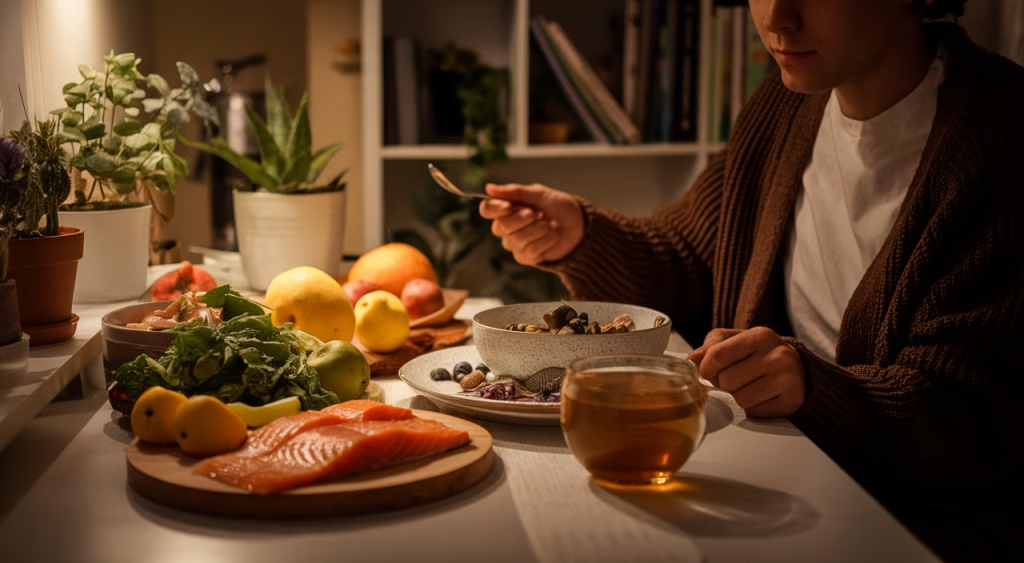Can Changing Your Diet Actually Help Reduce Snoring?
Yes — the foods you eat play a surprising role in how loudly you (or your partner) might snore at night. Diet isn’t always the first thing people consider when addressing snoring, but as a nutritionist who works with sleep health daily, I’ve seen firsthand how nutrition tweaks can bring real relief. Let’s explore how foods reduce snoring and help support better, quieter sleep.
- 🍽 Light evening meals help prevent nighttime snoring
- 🥬 Anti-snoring foods fight inflammation and ease breathing
- 🌙 Healthy snacks can relax throat muscles and promote sleep
- 📋 A smart diet for snoring supports long-term reduction in snoring
- 💡 Small consistent changes to your diet = lasting improvement
How Diet Affects Snoring
Impact of Heavy Meals on Snoring
Here’s what often happens: You enjoy a satisfying, heavy dinner late in the evening — maybe a creamy pasta or fried takeout — and hit the bed right after. Later, you or your bed partner gets woken up by loud rumbling snores. Coincidence? Not quite.
Heavy or greasy meals can slow digestion and place pressure on your diaphragm, especially when lying down. This restricts airflow and increases the chances of snoring. Spicy or acidic foods can also cause acid reflux, irritating the throat and further narrowing your airway. Understanding this connection is crucial when developing a diet for snoring reduction.
Benefits of Light Evening Meals
Switching to a lighter evening meal can make a significant difference in reducing snoring naturally. Think baked salmon over greens, or a bowl of vegetable soup with quinoa. These snoring-friendly meals are easier to digest, reduce bloating, and promote smoother breathing throughout the night.
Adding digestion-friendly herbs like ginger, turmeric, and cilantro can soothe inflammation and assist your body’s natural overnight repair processes — plus, they taste amazing and work as natural anti-snoring foods!
Best Foods for Reducing Snoring
Anti-Snoring Foods to Include
Foods that reduce snoring typically fall into three helpful categories: anti-inflammatory, hydrating, and muscle-relaxing. These anti-snoring foods can become the foundation of your snoring-friendly meals.
- Leafy greens: High in magnesium, which promotes muscle relaxation and encourages deeper sleep. These are essential foods that reduce snoring.
- Fatty fish (like salmon or mackerel): Packed with omega-3 fatty acids that reduce inflammation in the airways, making them powerful anti-snoring foods.
- Pineapple and citrus fruits: Contain enzymes and antioxidants that support clear breathing and work as natural foods that reduce snoring.
- Olive oil and nuts: Help lubricate mucous membranes and keep throat tissues supple, supporting your diet for snoring reduction.
- Spices like turmeric and ginger: Known for their anti-inflammatory properties and digestive benefits, these are key anti-snoring foods.
Snack Ideas for Better Sleep
Here’s the golden rule for snoring-friendly meals: Choose snacks that satisfy without overwhelming your system. Great nighttime options include foods that reduce snoring naturally:
- Banana with a spoon of almond butter (rich in potassium and magnesium)
- Plain yogurt with a drizzle of honey and berries
- Oatmeal with cinnamon and chopped walnuts
- A warm turmeric or chamomile tea to unwind
Creating a Snoring-Friendly Diet Plan
Nutritional Tips for Snoring Relief
Consistency is key when using diet for snoring reduction. Here are dietary principles that support long-term snoring relief using anti-snoring foods:
- Stay hydrated: Dry throat tissues vibrate more and worsen snoring. Aim for 6–8 glasses of water daily as part of your diet for snoring.
- Avoid alcohol and dairy before bed: Alcohol relaxes throat muscles too much, while dairy can thicken mucus and counteract foods that reduce snoring.
- Increase fiber intake: Foods like lentils, oats, and beans improve digestion and reduce nighttime reflux, supporting snoring-friendly meals.
- Time your meals: Finish dinner 2–3 hours before bedtime to allow digestion time and maximize the benefits of anti-snoring foods.
Meal Planning for Improved Sleep
Let’s say your goal is not just fewer snores but better sleep overall. Planning balanced snoring-friendly meals across the day with foods that reduce snoring can set a solid foundation:
| Meal | Example |
|---|---|
| Breakfast | Oatmeal with banana, chia seeds, and almond milk |
| Lunch | Grilled chicken salad with leafy greens, avocado, and citrus vinaigrette |
| Dinner | Baked salmon with steamed broccoli and quinoa |
| Snack | Chamomile tea with almonds, or yogurt with berries |
Cost Guide: Anti-Snoring Groceries in Singapore
Wondering how budget-friendly anti-snoring foods are? Here’s a quick estimate of common ingredient costs for creating snoring-friendly meals in Singapore:
| Item | Low-End Price | Mid-Range Price | High-End Price |
|---|---|---|---|
| Leafy Greens (Spinach, Kang Kong) | $1.50 | $2.50 | $3.90 |
| Fresh Salmon (200g) | $6.00 | $8.50 | $12.00 |
| Pineapple / Citrus Fruit | $1.20 | $2.00 | $3.80 |
| Turmeric / Ginger (per 100g) | $0.80 | $1.20 | $2.50 |
Frequently Asked Questions
1. What causes snoring to worsen at night?
Lying down relaxes throat muscles and can narrow airways. Eating heavy meals, drinking alcohol, or having nasal congestion can further restrict airflow and worsen snoring.
2. Are there specific foods that stop snoring immediately?
No food acts like an instant switch, but incorporating anti-snoring foods and following a diet for snoring regularly can reduce snoring over time.
3. Can dairy trigger snoring?
Yes, for some people, dairy creates thicker mucus that clogs airways and increases snoring risk — especially before bed. This is why dairy should be limited when focusing on foods that reduce snoring.
4. Should I avoid all meat to stop snoring?
Not necessarily. Fatty fish are excellent anti-snoring foods thanks to omega-3s. Processed or fatty red meats, though, may contribute to inflammation and should be limited in snoring-friendly meals.
5. How long before bedtime should I stop eating?
Try to finish eating 2–3 hours before you go to bed. This gives your digestive system time to settle and reduces the risk of reflux-related snoring, allowing anti-snoring foods to work effectively.
6. Are herbal teas helpful for snoring?
Yes. Teas like chamomile, peppermint, and turmeric are excellent foods that reduce snoring. They can relax muscles, reduce inflammation, and promote restful sleep — all helpful in your diet for snoring reduction.
7. Does losing weight help with snoring too?
Definitely. Weight loss can reduce extra tissue around your neck and airway, making it easier to breathe and greatly reducing snoring for many people. Combining weight loss with anti-snoring foods creates powerful results.





